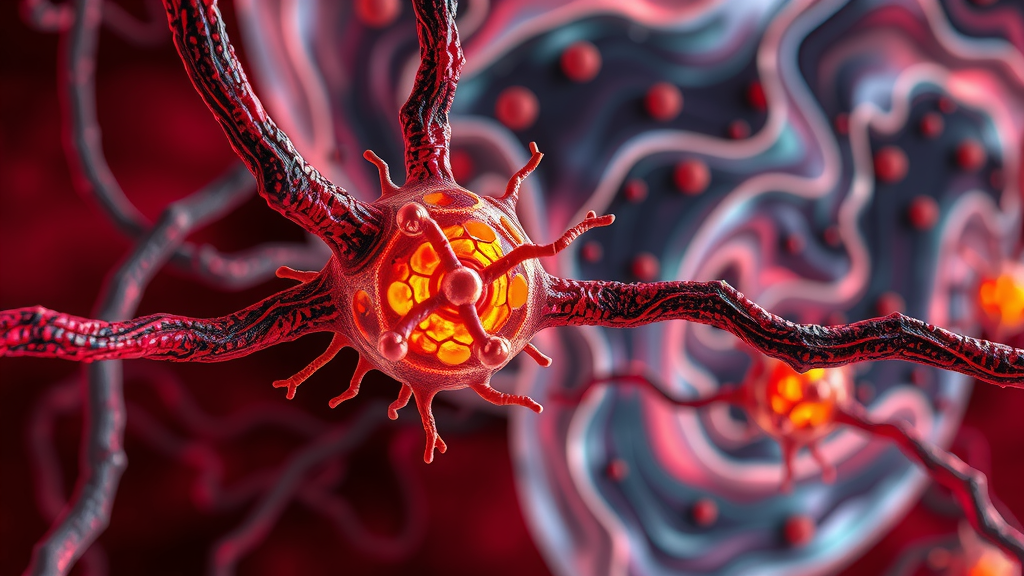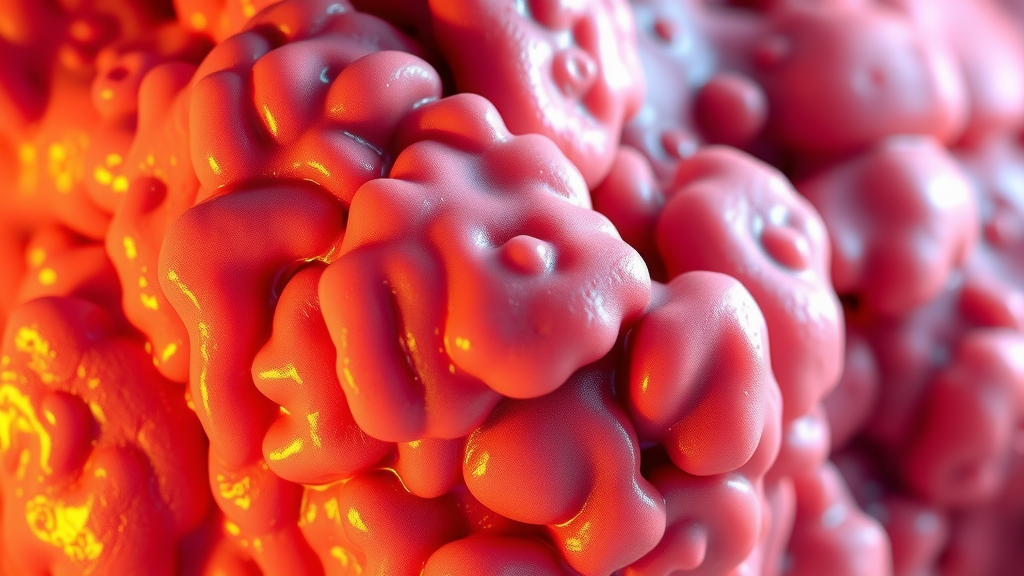
Chronic inflammation is a hidden adversary impacting many health aspects. This prolonged inflammatory response can lead to various health conditions such as heart disease, diabetes, and autoimmune disorders.
Inflammation can stem from various sources, including persistent infections, obesity, and exposure to toxins.
Research indicates that when the immune system detects a virus, it may mistakenly continue its response, resulting in chronic inflammatory states.
Poor dietary choices, particularly the consumption of processed foods high in sugar and unhealthy fats, can exacerbate inflammation in the body. Lifestyle factors such as stress and inadequate sleep also play significant roles in triggering this persistent inflammatory response.
‘Click here to learn more about:’ the ultimate anti inflammatory guide
Understanding The Role Of Diet In Inflammation
Diet plays a significant role in influencing inflammation levels within the body.
Consuming anti-inflammatory foods can help mitigate chronic inflammation, while certain dietary components may amplify it. Some foods and their impacts include:
Anti-Inflammatory Foods
- Fruits: Rich in antioxidants, fruits like berries and cherries help reduce inflammation.
- Leafy Vegetables: Spinach and kale are excellent sources of vitamins that support anti-inflammatory processes.
- Omega-3 Fatty Acids: Fatty fish such as salmon and walnuts contain these essential fats known to combat inflammation.
- Turmeric: This spice contains curcumin, which is recognized for its strong anti-inflammatory properties.
- Whole Grains: Foods like brown rice and oats provide fiber, which may help decrease inflammation.
Inflammatory Foods to Avoid
Conversely, certain foods can trigger inflammatory responses. These include:.
- Processed Sugars: Found in many fast foods, these can significantly cause inflammation.
- Refined Carbohydrates: White bread and pastries often exacerbate inflammatory conditions.
- Unhealthy Fats: Trans fats and high levels of saturated fats found in fried foods increase inflammation.
- Sodium: High sodium intake can lead to increased inflammation and is commonly found in processed foods.
A balanced intake of fruits, vegetables, and whole grains is essential, as these provide necessary nutrients and antioxidants that foster an anti-inflammatory environment. Adopting a Mediterranean diet, which emphasizes healthy fats and whole foods, is often recommended for reducing chronic inflammation.

Chronic Inflammation Solutions
Effective management of chronic inflammation involves multiple strategies, such as:
- Dietary Changes: Emphasizing anti-inflammatory foods to reduce symptoms.
- Regular Exercise: Engaging in moderate physical activity to boost immune function.
- Stress Management: Incorporating mindfulness and relaxation techniques.
- Sleep Optimization: Prioritizing restful sleep supports the body’s healing processes.
- Supplements: Utilizing omega-3 fatty acids, turmeric, and antioxidants.
- Hydration: Staying well-hydrated supports cellular functions and detoxification.
- Avoiding Triggers: Identifying and avoiding allergens that worsen symptoms.
- Regular Check-Ups: Consulting healthcare providers to monitor inflammation markers.
- Smoking Cessation: Quitting smoking lowers inflammation.
- Weight Management: Maintaining a healthy weight to reduce metabolic stress.
To mitigate chronic inflammation effectively, integrating these lifestyle changes, along with a focus on anti-inflammatory foods, is essential for improving overall health and well-being.
How Viruses Contribute To Inflammatory Responses
Viruses are significant agents of inflammation, triggering responses that are critical for addressing infections. When a virus invades a host, such as the influenza virus, it penetrates cells and incites an immune system response.
This response involves the release of cytokines and interferons, which are proteins that facilitate inflammation.
For instance, the influenza virus can lead to a hyper-inflammatory state, producing symptoms like fever and muscle aches due to the body’s reaction to the viral invasion.
Persistent viral infections, such as those caused by hepatitis B, can result in chronic liver inflammation. This long-term inflammation may adversely affect the liver’s functionality and overall health.
These mechanisms showcase the intricate relationship between viral infections and chronic inflammation, a central concern in various chronic diseases. By understanding how viruses influence the inflammatory process, researchers can better assess their role in chronic inflammatory conditions.
The Impact Of Obesity On Chronic Conditions
Obesity serves as a major contributing factor to the exacerbation of chronic conditions through its impact on inflammation.
Excess body fat produces pro-inflammatory cytokines, creating a persistent state of low-grade inflammation in the body.
This inflammatory process increases the risk of developing conditions such as type 2 diabetes, where the body’s ability to signal glucose is impaired due to elevated inflammation.
Obesity is closely associated with cardiovascular disease, where inflammation plays a role in increasing heart disease risks.
Symptoms of inflammatory joint diseases, such as rheumatoid arthritis, may also intensify due to obesity, indicating the importance of maintaining a healthy weight as a strategy for managing chronic health conditions. Understanding the link between obesity and inflammation provides insight into potential interventions for reducing the impact of obesity-related health issues.
Chronic Inflammation Solutions
Addressing chronic inflammation requires a multifaceted approach that includes lifestyle modifications and dietary adjustments.
Below are effective strategies:
- Dietary Changes: Focus on anti-inflammatory foods such as fruits, vegetables, nuts, and whole grains to reduce symptoms.
- Regular Exercise: Participate in moderate physical activity to enhance immune function.
- Stress Management: Implement mindfulness and relaxation techniques to decrease stress levels.
- Sleep Optimization: Ensure restful sleep is prioritized, supporting the body’s healing processes.
- Supplements: Use omega-3 fatty acids, turmeric, and antioxidants to combat inflammation.
- Hydration: Maintain sufficient hydration to facilitate cellular functions and detoxification.
- Avoiding Triggers: Identify and steer clear from allergens and irritants that may worsen symptoms.
- Regular Check-Ups: Consult healthcare providers to monitor inflammation levels and markers.
- Smoking Cessation: Quit smoking to reduce inflammation and improve health.
- Weight Management: Sustain a healthy weight to alleviate metabolic stress.
Chronic inflammation can lead to serious health issues if left unmanaged.
These comprehensive strategies not only target inflammation but also enhance overall health. Engaging in a diet rich in anti-inflammatory properties, coupled with regular exercise and stress reduction techniques, plays a vital role in promoting wellness and preventing chronic diseases.
Inflammation and Health
- Chronic inflammation is linked to various diseases, including heart disease, diabetes, and cancer.
- Pro-inflammatory cytokines produced by excess body fat can lead to a state of low-grade inflammation.
- Regular physical activity has been shown to reduce inflammation and improve immune function.
- Incorporating anti-inflammatory foods into the diet can significantly lower inflammation markers in the body.
Effective Anti-Inflammatory Foods To Include
Incorporating a variety of anti-inflammatory foods into your diet is essential for effective management of chronic inflammation. Foods abundant in antioxidants and healthy fats, such as berries and salmon, play a significant role in helping to reduce inflammation markers in the body.
To maximize the benefits of these foods, consider incorporating berries into your morning smoothie or making salmon a regular part of your weekly meals.
Leafy Greens
Including leafy greens such as spinach and kale in your meals can enhance nutritional value; these vegetables are rich in vitamins and minerals that support overall health and contribute to reducing inflammation.
Nuts and Seeds
Integrating nuts and seeds, particularly walnuts and chia seeds, provides a robust source of omega-3 fatty acids, which are critical for combating inflammation.
These foods can be easily added to salads, yogurt, or oatmeal for an extra boost.
Remember: Including a diverse range of anti-inflammatory foods in your diet can significantly improve health and reduce inflammation over time.
The Benefits Of Omega-3 Fatty Acids
Ongoing research highlights the numerous health benefits of omega-3 fatty acids, particularly regarding the reduction of inflammation in the body. Omega-3s, commonly found in fatty fish like salmon and in sources such as chia seeds, play a crucial role in managing the inflammatory process.
Consumption of omega-3 fatty acids has been shown to significantly lower blood inflammatory markers, providing relief from symptoms associated with chronic conditions such as arthritis and other inflammatory diseases.
Sources of Omega-3 Fatty Acids
- Fatty Fish: Salmon, mackerel, sardines
- Plant-based Sources: Chia seeds, flaxseeds, walnuts
- Fortified Foods: Some eggs and dairy products
Recommended Daily Intake
The recommended daily intake for healthy adults includes approximately 250-500 mg of EPA and DHA combined from omega-3 sources. For vegetarians, aiming for 6 grams of ALA daily is advised. Regular incorporation of these sources into your diet can bolster your immune system and promote overall well-being.
Anti-Inflammatory Foods
- Studies show that diets rich in antioxidants can lower inflammation markers in the body.
- Omega-3 fatty acids are linked to reduced symptoms of chronic inflammatory diseases like arthritis.
- Regular consumption of fatty fish like salmon is associated with improved heart health and lower inflammation.
- Incorporating nuts and seeds into the diet can provide essential nutrients that combat inflammation effectively.
Exploring The Connection Between Infections And Inflammation
The relationship between infections and inflammation reveals important insights about our body’s defenses. Inflammation acts as a protective mechanism orchestrated by the immune system in response to invading pathogens, including both bacteria and viruses.
A notable example is Streptococcus pneumoniae, which can cause pneumonia.
This bacterial infection triggers an acute inflammatory response due to the release of harmful toxins.
Similarly, the influenza virus can incite significant respiratory inflammation, as viral replication damages cells and tissues, further exacerbating the immune response.
Bacterial Infections and Inflammation
Infections from bacteria often prompt a pronounced inflammatory response, which is critical for healing. Some common bacterial infections that lead to inflammation include:
- Streptococcus pyogenes: Responsible for strep throat, this bacterium can cause severe throat inflammation.
- Escherichia coli: Certain strains can lead to gastrointestinal inflammation, causing food poisoning.
- Mycobacterium tuberculosis: This bacterium can result in chronic inflammation in the lungs, leading to tuberculosis.
Viral Infections and Their Impact
Viral infections also play a critical role in initiating inflammation. For instance:
- Human Immunodeficiency Virus (HIV): This virus can lead to chronic inflammation, adversely affecting the immune system over time.
- COVID-19: This novel virus has been linked to acute respiratory distress syndrome, resulting in profound inflammatory responses throughout the body.
This inflammatory response is essential for healing; however, unchecked inflammation can lead to chronic inflammation, contributing to persistent health issues such as rheumatoid arthritis and cardiovascular disease.
Nonsteroidal Anti-Inflammatory Drugs Explained
Many people rely on nonsteroidal anti-inflammatory drugs (NSAIDs) to manage inflammation and pain effectively. These medications, including ibuprofen and naproxen, function by inhibiting cyclooxygenase (COX) enzymes, which play a pivotal role in producing prostaglandins—substances that support inflammation.
Mechanism of Action
By blocking COX enzymes, NSAIDs decrease the production of prostaglandins, leading to:.
- Reduced pain and swelling
- Lowered fever
Potential Side Effects
While NSAIDs provide significant benefits, they may also pose risks, particularly when used for prolonged periods. Common side effects include:.
- Gastrointestinal Issues: Prolonged use can lead to ulcers and bleeding.
- Cardiovascular Risks: Certain NSAIDs have been linked to increased heart attack risks.
Consulting a healthcare provider before using NSAIDs, especially for individuals with existing health conditions, is a prudent approach. Awareness of these medications’ effects can help mitigate potential risks while managing inflammation effectively.
Chronic Inflammation Solutions
Managing chronic inflammation is crucial for overall wellness and can significantly impact conditions such as heart disease, diabetes, and autoimmune disorders. Various approaches to mitigate chronic inflammation include:
Dietary Changes
Emphasizing anti-inflammatory foods can help reduce symptoms:
- Fruits and vegetables
- Whole grains
- Nuts and seeds
- Healthy fats like those found in fish and olive oil
Regular Exercise
Engaging in moderate physical activity boosts immune function and lowers inflammation levels.
Stress Management
Incorporating mindfulness and relaxation techniques can effectively lower stress, which is linked to inflammation.
Sleep Optimization
Prioritizing restful sleep supports the body’s natural healing processes and helps control inflammation.
Supplements and Hydration
Using omega-3 fatty acids, turmeric, and antioxidants may combat inflammation. Staying well-hydrated also supports cellular functions and detoxification.
Avoiding Triggers and Monitoring Health
- Identifying and avoiding allergens can alleviate symptoms.
- Regular check-ups with healthcare providers are essential to monitor inflammation markers.
Additional Recommendations
- Smoking Cessation: Quitting smoking lowers inflammation and improves overall health.
- Weight Management: Maintaining a healthy weight reduces metabolic stress.
By implementing these strategies, individuals can manage chronic inflammation
Infections and Inflammation
- Inflammation is a key component of the immune response that helps to eliminate pathogens such as bacteria and viruses.
- Chronic inflammation can lead to serious health issues, including autoimmune diseases and cardiovascular problems.
- Nonsteroidal anti-inflammatory drugs (NSAIDs) are commonly used to manage inflammation but may have side effects if used long-term.
- Dietary changes, regular exercise, and stress management are effective strategies for reducing chronic inflammation.
The Healing Power Of Turmeric In Chronic Inflammation
Turmeric serves as a remarkable natural remedy known for its benefits in combating chronic inflammation. Curcumin, the primary active compound in turmeric, exhibits powerful anti-inflammatory properties by modulating various biological pathways that significantly impact inflammation in the body.
Additionally, curcumin functions as a potent antioxidant, effectively combating oxidative stress that contributes to inflammation.
Recent research reveals that curcumin effectively reduces the production of pro-inflammatory cytokines, assisting in the alleviation of chronic inflammation.
To incorporate turmeric into your diet, consider adding it to smoothies, soups, or preparing a soothing cup of golden milk—a delicious way to experience its health benefits.
Reducing Inflammation Through Healthy Lifestyle Choices
Making intentional lifestyle choices can play a significant role in managing chronic inflammation. Dietary changes that emphasize anti-inflammatory foods contribute to reducing symptoms.
Incorporating fruits, vegetables, and omega-3 fatty acids nourishes the immune system and supports overall health. Regular exercise, such as brisk walking or yoga, enhances immune function and lowers inflammation markers, contributing to improved physical well-being.
Physical Activity
Engaging in moderate physical activity several times a week can significantly impact inflammation levels.
Exercise promotes circulation and aids in reducing markers associated with chronic conditions.
Activities like swimming, cycling, and resistance training are beneficial for encouraging a healthy inflammatory response.
Stress Management Techniques
Implementing mindfulness and relaxation techniques can lower stress levels, which are known to exacerbate inflammation.
Practices like meditation, deep breathing exercises, and yoga not only help reduce stress but also enhance mental clarity and emotional well-being. Fostering a calm mind is instrumental in mitigating the body’s inflammatory response.
Sleep Optimization
Prioritizing restful sleep is essential for the body’s healing processes.
Quality sleep supports recovery and helps regulate the immune system, ultimately reducing inflammation. Adopting good sleep hygiene practices can significantly improve sleep quality, thereby benefiting overall health.
Hydration and Nutrition
Staying well-hydrated supports cellular functions and detoxification, aiding the body in managing inflammation.
In addition, consuming a diet rich in antioxidants—such as leafy greens, berries, and nuts—can further combat inflammation.
Avoiding inflammatory foods, particularly those high in sugar and unhealthy fats, is crucial for long-term health.
Regular Health Monitoring
Regular check-ups with healthcare providers can help monitor inflammation markers and adjust treatment plans accordingly.
This proactive approach enables early intervention and management of chronic inflammation, reducing health risks associated with conditions like autoimmune disorders and cardiovascular diseases.
By adopting these lifestyle changes, individuals can effectively reduce chronic inflammation and enhance their overall well-being, highlighting the importance of a holistic approach to health management.
Chronic Inflammation and Lifestyle Choices
- Curcumin in turmeric can reduce pro-inflammatory cytokines, aiding in the management of chronic inflammation.
- Regular physical activity can lower inflammation markers and improve immune function.
- Mindfulness practices, such as meditation and yoga, can help reduce stress, which is linked to increased inflammation.
- Good sleep hygiene is essential for regulating the immune system and reducing inflammation.
The Immune System’s Role in Managing Inflammation
Inflammation represents the immune system’s most immediate response to injury or infection, serving as a mechanism to protect the body. During this process, various inflammatory cells are recruited to the affected area, leading to the activation of the immune response.
Neutrophils and macrophages are some of the key immune cells that attack harmful invaders and initiate the healing process.
These cells release cytokines, signaling molecules that can facilitate tissue repair while potentially contributing to further damage if left unregulated.
The body’s inflammatory response operates on a delicate balance between pro-inflammatory and anti-inflammatory actions.
An overwhelming pro-inflammatory response can lead to chronic inflammation, associated with diseases such as diabetes and autoimmune disorders. Research shows that maintaining this balance is essential to avoid chronic conditions that can disrupt overall health.
What You Need To Know About Inflammatory Diseases
The landscape of inflammatory diseases is diverse, encompassing conditions that significantly affect quality of life.
Common instances include rheumatoid arthritis and inflammatory bowel disease, both of which present unique symptoms and challenges. Symptoms typically manifest as joint pain, fatigue, and digestive discomfort, illustrating the variability among individuals.
Causes of Inflammatory Diseases
Multiple factors contribute to the onset of inflammatory diseases.
These can be autoimmune responses, where the immune system mistakenly attacks healthy tissue, or environmental influences such as pollution and stress that exacerbate symptoms.
Dietary habits also play a significant role, as foods high in sugar and unhealthy fats can promote inflammation.
Treatment Options
Managing inflammatory diseases often requires a multifaceted approach.
Treatment plans may incorporate anti-inflammatory medications, which can help alleviate symptoms and reduce inflammation levels. Lifestyle modifications—such as focusing on anti-inflammatory foods like leafy greens, omega-3-rich fish, and whole grains—can also be beneficial.
Incorporating regular exercise and practicing stress management techniques can enhance overall well-being and empower individuals to better manage their conditions.
Inflammation and Inflammatory Diseases
- Chronic inflammation is linked to serious health issues, including diabetes and autoimmune disorders.
- Inflammatory diseases like rheumatoid arthritis and inflammatory bowel disease can significantly impact an individual’s quality of life.
- Environmental factors such as pollution and stress can worsen the symptoms of inflammatory diseases.
- Dietary choices, particularly high sugar and unhealthy fats, can contribute to increased inflammation in the body.
Chronic Inflammation Signs | Unseen Truths
What Chronic Inflammation Does To The Body | Signs And Remedies At Your Medical Center



